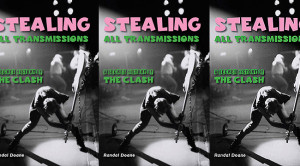Stealing All Transmissions: Where punk fits in

In his book Stealing All Transmissions: A Secret History of the Clash, Randal Doane, an Assistant Dean of Studies at Oberlin College, puts his sociology degree to work as he tries to come to terms with the British punk band’s popularity in New York in 1979. The book takes a behind-the-scenes look at the events that led to the band’s 1979 performance at the Palladium (the one that delivered the famous photo of Paul Simonon wielding his guitar like an ax). Doane is on a short book tour and recently phoned in to discuss the book.
What inspired you to want to write a book about The Clash?
I was doing an article on illegal file sharing in 2003 and I came across this MP3 and the title was something like Clash-Palladium-New York-Palladium-1979. I checked it out. It wasn’t quite for me. I’m not a big live album guy. But I kept coming back to the enigmatic file name. I thought, ‘Ok. The Clash have very little support from their domestic label in the UK or Epic Records here in the States. They come to New York on their second tour and they played the Palladium, which seated3000, while bands like The Police and Joe Jackson played the Bottom Line, which seated 400. It was broadcast live on WNEW, which was the last freeform station. Freeform doesn’t have much patience for punk.’ It’s an interesting historical fact. I read Richard Neer’s book The Rise and Fall of Rock Radio. I emailed him and he told me the next group of folks that I should talk would include Meg Griffin, Joe Piasek and Pam Merly. They were totally jazzed. It was great…DJs in their late fifties talk about punk and they start dropping f-bombs all over the place. They get pretty pumped. Meg Griffin was absolutely key. She opened up her Rolodex and gave me names and numbers to call.
At what point did you know if would be a book?
I originally pitched it as an article for The New Yorker. I had a nice flirtation with them but ultimate heartbreak. I let it sit for a while and went back to the longer version. I decided to expand it and found a publisher and they had interest. It had jumped from 20,000 pages to 30,000. That’s the book you have.
It’s not just about the Clash specifically. You recount the history of the term punk, which actually dates back to the 16th century.
William Shakespeare. My training is in sociology so I think about how bigger forces weigh on individual choices and issues of identity. I never appreciated Van Halen when I was a kid but, looking back on it, I realize I needed Van Halen as much as the Clash just so I could define myself and my comrades negatively. We always hated David Lee Roth but we didn’t know why. Now, I have a soft spot for him.
Are you a fan of The Clash?
I was raised on radio in the San Joaquin Valley. It was not that rich. Once I came back from England in the summer of 1982, I got turned out to music I had never heard, even though some of it came from the States. I was hanging out on Coventry and spending time in London and admiring the punks with their absolutely amazing mohawks in West Berlin. I was taking in the second wave. The older brother of the family I stayed with was a big Mod and made me an amazing tape that started up with “London Calling.” That was a baptism of sorts.
The subtitle is “the secret history of the Clash.” Why “secret”?
Well, some people would look toward Greil Marcus’s Lipstick Traces: A Secret History of the 20th Century as the inspiration, but I was looking at this novel by Donna Tartt called The Secret History. There was no American history of the Clash. It is the first American history. Calling it that is a little bit bold. I don’t focus on what happened outside of New York and people worked hard to create the scenes in San Francisco and L.A. Even guys that worked for the Clash like The Baker, their roadie for the first six years, read the book and he didn’t know this stuff. That makes sense because it would be harder to see from the inside than the outside. These radio wars and battles have been recorded in certain books in terms of the impact on the rise of rock as art, but no one saw where punk fit in. All these figures knew exactly where punk was in terms of the arc of musical history. Meg Griffin says you can see the continuation from Bo Diddley.
The Clash’s exposure on WNEW helped break the band in the States. Are you nostalgic for the days when radio DJs could choose what songs they played?
Well, yes. I don’t want to reduce my book to a requiem because I don’t think that honors the legacy of Joe Strummer and The Clash very well, but there is something qualitatively different. I like to think in general that radical democracy is more fun than not.
Note: You can follow Randal Doane on his blog.











